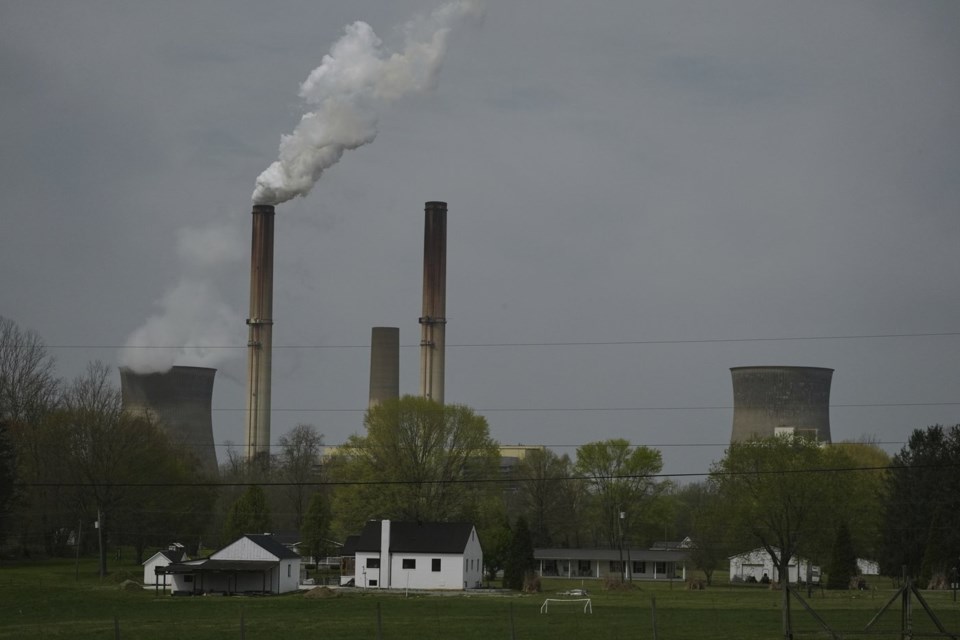WASHINGTON (AP) — A Trump administration proposal to reverse a landmark finding that climate change is dangerous to the public relies heavily on a report from the Department of Energy that dozens of scientists say is flawed.
The Environmental Protection Agency is seeking to use the DOE's work to overturn the climate concept known as the “endangerment finding.” If the administration succeeds, many laws and rules aimed at reducing or restricting greenhouse gas emissions could be eliminated.
The Associated Press surveyed scientists for their views. Here are some key takeaways from those who responded to AP's questions:
The work included some silly errors, but far more complaints were about bias and distortion
The most common critique from 64 scientists who responded to questions from AP was that the administration’s reports ignored, twisted or cherry-picked information to manufacture doubt about the severity and threat of climate change. Fifty-three of the 64 scientists criticized the quality of the reports.
The Department of Energy report said Arctic sea ice has declined about 5% since 1980. That number is accurate for Antarctica, while Artic sea ice actually declined more than 40% in the period.
Jennifer Marlon, director of data science at the Yale Program on Climate Change Communication, highlighted a section on U.S. wildfires that acknowledged that fire data from before 1960 isn't reliable for comparisons. Yet the administration used that unreliable data in a chart going back to 1920, leaving readers with the impression that wildfire rates were higher many decades ago than they are now, Marlon said.
What scientists said was evidence of ‘cherry-picking’
Experts repeatedly said the reports were biased. Nineteen scientists used variations of the phrase “cherry pick” to describe citations in the administration reports.
Francois Bareille, a French economist, has done work concluding that previous estimates about climate-related crop losses in French agriculture were overly pessimistic. The administration’s reports cited that work, but Bareille said it shouldn’t have because it’s wrong to generalize his findings to other regions.
Climate scientist Zeke Hausfather said the reports pulled a single figure from his work on climate modeling to build a case that the models scientists use are often overly pessimistic. Hausfather said his research actually concluded that climate models have performed quite well.
He called the government’s process a “farce.”
What do the report's authors and the government say?
The authors of the report said any errors found will be corrected.
In a joint statement, authors of the Energy Department report said the document clearly says it's not meant to be a comprehensive review of climate science. Instead, the authors said, it's focused on data and topics that the media and others have underreported and overlooked.
A few scientists strongly back what's in the report
A handful of scientists contacted by AP spoke positively about the report.
One expert cited in the work praised it, saying it departed from unnecessarily alarmist findings of other national and international climate assessments.
James Davidson, a professor at the University of Exeter focused on economics, has published work that disputes the mainstream consensus that rising carbon dioxide levels in the past caused warming.
He said the Department of Energy report is giving voice to beliefs that were previously shut out.
What scientists are doing and what citizens can do
Mainstream scientists have already mobilized to respond. A few have voiced criticism on social media. The National Academy of Sciences, a collection of private, nonprofit institutions set up to provide independent and objective analysis, is preparing a fast-tracked special report on the latest evidence about whether greenhouse gas emissions endanger public health.
The Energy Department is taking public comments on its work until Sept. 2. The EPA is holding several days of public hearings, with comments due by Sept. 22.
___
The Associated Press’ climate and environmental coverage receives financial support from multiple private foundations. AP is solely responsible for all content. Find AP’s standards for working with philanthropies, a list of supporters and funded coverage areas at AP.org.
Seth Borenstein And Michael Phillis, The Associated Press



